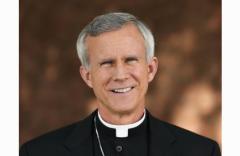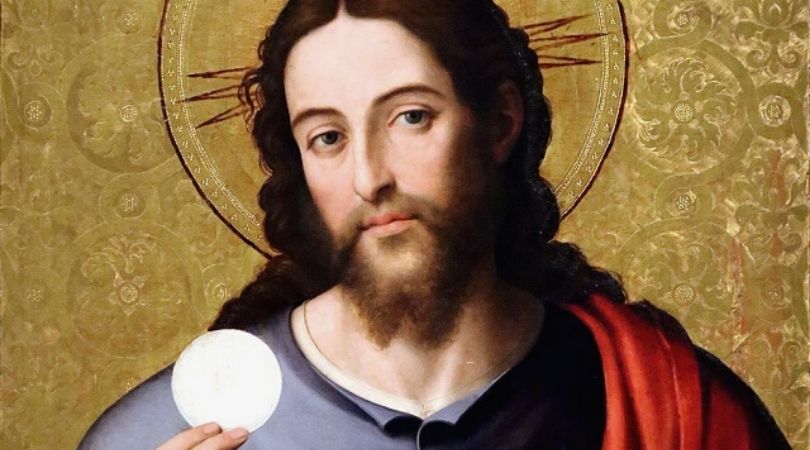Liberty or Tyranny? We Have a Choice to Make, America, by Allen West
June 29, 2020Archives: Msgr. Charles Pope: The Times Are Urgent and We Must Heed the Warnings of Our Lady (10/10/17)
June 29, 2020
By Most Reverend Bishop Joseph Strickland, The Wanderer, June 3, 2020
(Republished with permission of Mr. Joe Matt, The Wanderer)
Part 3

Bishop Joseph Strickland. (Diocese of Tyler, Texas)
In one of the Missionary journeys of the Apostle Paul to the Greek city of Ephesus, recorded in the nineteenth chapter of the Acts of the Apostles, he encountered some of the Disciples of John the Baptizer (see Acts 19:1-10). He asked them: “Did you receive the Holy Spirit when you became believers?” They answered him, “We have never even heard that there is a Holy Spirit.” The Apostle Paul catechized them and laid his hands upon them, so they encountered the living presence of the Holy Spirit.
That passage comes to my mind as I try to assist Catholics (and other Christians) in informing their consciences in accordance with authentic Catholic Social Teaching. This rich wellspring of teaching, inspired by the Holy Spirit, is often unknown to many Catholics. It is as though they “. . . have never heard that there even was a Social Teaching.”
Or, some, when they do become aware of the existence of Catholic Social Teaching, begin with politically partisan positions and then try to use Catholic Social Teaching as a sort of “proof text” to support their own positions, rather than use the Social Teaching to inform their conscience and then help to shape their social and economic positions.
We need to start with authentic Catholic Social Teaching, not the favored political or economic positions of someone interpreting it through their own filter, even if such people are well intended. After all, those who are baptized into Christ now live our lives, in a real sense, “in the Church,” as members of the Mystical Body of Christ. And, we are sent into the world as members of a redemptive community on mission. Part of that mission is social.
So, how do the principles and truths offered by Catholic Social Teaching address the economic implications of working them into the social order? Does Catholic Social Teaching propose an economic theory? The answer is, not specifically. But it does offer truths and principles which should guide the formulation and application of any economic theory.
Let us turn to the Catechism of the Catholic Church for direction, as we have in past columns. Particularly nn. 2422-2425: “The Church’s social teaching comprises a body of doctrine, which is articulated as the Church interprets events in the course of history, with the assistance of the Holy Spirit, in the light of the whole of what has been revealed by Jesus Christ. This teaching can be more easily accepted by men of good will, the more the faithful let themselves be guided by it.
“The Church’s social teaching proposes principles for reflection; it provides criteria for judgment; it gives guidelines for action: Any system in which social relationships are determined entirely by economic factors is contrary to the nature of the human person and his acts.”
So, it is not just economic theories which should guide the consideration of economic matters, but rather the recognition of the dignity of the human person, and the call to serve the real common good by promoting a social order which fosters authentic freedom, encourages innovation, expands participation, and honors hard work and achievement. Serving the real “Common Good,” that “sum-total of social conditions which promotes human freedom and flourishing,” has economic applications. For example, materialism, any economic approach which values profit but disregards persons, is not a system which has embraced the principles and truths offered by the Social Teaching of the Catholic Church.
Again, the Catechism speaks with clarity:
“A theory that makes profit the exclusive norm and ultimate end of economic activity is morally unacceptable. The disordered desire for money cannot but produce perverse effects. It is one of the causes of the many conflicts which disturb the social order. A system that ‘subordinates the basic rights of individuals and of groups to the collective organization of production’ is contrary to human dignity. Every practice that reduces persons to nothing more than a means of profit enslaves man, leads to idolizing money, and contributes to the spread of atheism. ‘You cannot serve God and mammon’.”
Yet, contrary to some who have tried to use Catholic Social Teaching as a proof text to tacitly endorse, or even promote, “left-leaning” economic theories, these theories are NOT a proper application of these truths and principles. Nor are capitalist economic theories which do not begin with the dignity of every human person, the primacy of the family, a concern for the poor and the service of the common good. The Catechism summarizes that especially important point in these words: “The Church has rejected the totalitarian and atheistic ideologies associated in modem times with ‘communism’ or ‘socialism.’ She has likewise refused to accept, in the practice of ‘capitalism,’ individualism and the absolute primacy of the law of the marketplace over human labor. Regulating the economy solely by centralized planning perverts the basis of social bonds; regulating it solely by the law of the marketplace fails social justice, for ‘there are many human needs which cannot be satisfied by the market.’ Reasonable regulation of the marketplace and economic initiatives, in keeping with a just hierarchy of values and a view to the common good, is to be commended.”
All of these paragraphs in the Catechism are footnoted to the Bible, the Apostolic Fathers, the Christian Tradition, and the social encyclicals of the Catholic Church (CCC, nn. 2422-2425). They should be read and studied by every Catholic and other Christian sincerely seeking to evaluate economic concerns.
Contemporary Catholic Social Teaching is often associated with the promulgation of Pope Leo XIII’s “On Capital and Labor” (1891) (Rerum Novarum in Latin) and the trajectory of modern papal encyclicals which have been released since. That includes the writings of Pope St. John XXIII, Pope St. Paul VI, and the multiple contributions of Pope St. John Paul II, to whom the Compendium of the Social Doctrine of the Church is dedicated. Also, Pope Emeritus Benedict XVI and Pope Francis.
Rerum Novarum dealt with some of the negative effects of the industrial revolution, including the loss of a sense of the dignity of the human person which accompanied this major social and economic shift. But, as cited earlier, it did so “as the Church interprets events in the course of history.” So, while it dealt with what might be considered “economic issues,” it was time sensitive. That is why Pope St. John Paul II addressed it in his encyclical written on the one hundredth anniversary of that encyclical.
Catholic Social Teaching does not support one economic theory over another. We must always remember what the Social Teaching offers. As the Catholic Catechism explains, principles and truths are to be applied by the faithful in the situation of their time.
The primary reason we should consider economics and seek to expand economic opportunity is because we respect the dignity of every human person because they are created in the Image of God and because we want to see all men and women find true freedom and happiness. We should seek to expand economic participation so that more and more people can participate in the economy and flourish.
Contemporary, lived experience has shown that big, centralized, and statist government and economic approaches have not been immensely helpful in caring for the financially poor. In fact, centralized command economies have been critiqued in other, later social teaching. For example, on the one hundredth anniversary of Pope Leo XIII’s encyclical on economic concerns, Pope St. John Paul wrote:
“Returning now to the initial question: can it perhaps be said that, after the failure of Communism, capitalism is the victorious social system, and that capitalism should be the goal of the countries now making efforts to rebuild their economy and society? Is this the model, which ought to be proposed to the countries of the Third World, which are searching for the path to true economic and civil progress? The answer is obviously complex.
“If by capitalism is meant an economic system, which recognizes the fundamental and positive role of business, the market, private property, as well as free human creativity in the economic sector, then the answer is certainly in the affirmative, even though it would perhaps be more appropriate to speak of a ‘business economy,’ ‘market economy,’ or simply ‘free economy.’
“But, if by ‘capitalism’ is meant a system in which freedom in the economic sector is not circumscribed within a strong juridical framework which places it at the service of human freedom in its totality and sees it as a particular aspect of that freedom, the core of which is ethical and religious, then the reply is certainly negative” (Centesimus Annus, n. 42).
The Catholic Church reminds all men and women of our obligation to give a love of preference to the poor because this is the kind of love which the Lord Himself shows in His identification with the poor. The implications of our response to this command are expounded upon in the 25th chapter of the Gospel of St. Matthew. This means incorporating in the social order a concern for their wellbeing.
So, we should seek to promote an economic system which includes them within its embrace and expands the promise of participation and advancement. Catholic social teaching does not propose one economic theory. Rather, it insists that every economic system must first be at the service of the dignity of the human person and the family, and further the real common good. In recent encyclicals and magisterial teaching, the market or free economy has been recognized as having a real potential for promoting these — when properly understood and morally structured.
The Catholic Church prophetically stood against the materialism of the atheistic Marxist system. She prophetically cautioned nations which have adopted a form of liberal capitalism that there are dangers in any form of which promotes the use of persons as products and fails to recognize the value of being over acquiring. She reminds consumerist Western culture that the market economy must be at the service of the human person, the family, and the common good, lest “capitalism” conflate its claims to offering freedom and become what Pope St. John Paul II once referred to as “savage” in its application and encourage business practices which devolve into greed.
But the Catholic Church warns against — and rejects — collectivism, whether of the left or the right on the political spectrum. The Church’s social doctrine holds that authentically human social relationships of friendship, solidarity, and reciprocity can also be conducted within economic activity and are not outside it or after it. As Pope Emeritus Benedict XVI wrote in his 1999 encyclical letter, Charity in Truth:
“Economic activity cannot solve all social problems through the simple application of commercial logic. This needs to be directed towards the pursuit of the common good, for which the political community in particular must also take responsibility. Therefore, it must be borne in mind that grave imbalances are produced when economic action, conceived merely as an engine for wealth creation, is detached from political action, conceived as a means for pursuing justice through redistribution.
“The Church has always held that economic action is not to be regarded as something opposed to society. In and of itself, the market is not, and must not become, the place where the strong subdue the weak. Society does not have to protect itself from the market, as if the development of the latter were ipso facto to entail the death of authentically human relations. Admittedly, the market can be a negative force, not because it is so by nature, but because a certain ideology can make it so.
“It must be remembered that the market does not exist in the pure state. It is shaped by the cultural configurations which define it and give it direction. Economy and finance, as instruments, can be used badly when those at the helm are motivated by purely selfish ends. Instruments that are good in themselves can thereby be transformed into harmful ones. But it is man’s darkened reason that produces these consequences, not the instrument per se. Therefore, it is not the instrument that must be called to account, but individuals, their moral conscience and their personal and social responsibility.
“The Church’s social doctrine holds that authentically human social relationships of friendship, solidarity and reciprocity can also be conducted within economic activity, and not only outside it or ‘after’ it. The economic sphere is neither ethically neutral, nor inherently inhuman and opposed to society. It is part and parcel of human activity and precisely because it is human, it must be structured and governed in an ethical manner” (n. 36, Charity in Truth).
Contrary to what some wrote after that letter was published, it neither endorsed nor rejected capitalism. As the Social Teaching of the Catholic Church consistently has done in the past, it simply did not use the term, preferring to use the terms “market economy” or “free economy.” So too with the apostolic exhortation entitled The Joy of the Gospel authored by Pope Francis but begun by Pope Emeritus Benedict XVI.
Markets can only be free when free people are engaged in them. Freedom is a good of the person. A free economy should also seek to continually expand by opening the way for the participation for as many people as possible, while encouraging, promoting, and rewarding enterprise and initiative.
The Catechism defines subsidiarity as the principle that “a community of a higher order should not interfere in the internal life of a community of a lower order, depriving the latter of its functions, but rather should support it in case of need and help to coordinate its activity with the activities of the rest of society, always with a view to the common good” (CCC, n. 1883). So, the principle has economic applications as well.
We are to give a love of preference to the poor, recognizing our solidarity with them. But, this call to solidarity is to be applied through the application of the principle of subsidiarity, rejecting all forms of dehumanizing collectivism, either of the left or the right. Subsidiarity in governance and economic participation rejects the usurping by a larger entity of participation which can be done at the lowest practicable level.
The West, with all its promise of freedom, flirts with an instrumentalist materialism devoid of any understanding that the market was made for man not man for the market. In this mistaken approach to a market economic order the accumulation of capital can come to be viewed as prior to the flourishing of the person, the family and the common good.
We cannot separate moral, social, and economic issues in the body politic, just as we cannot separate the spirit, soul and body of a person. Human society is a form of corporate person. All our political and economic concerns have some moral dimension because they concern the human person. The reason we care about expanding economic opportunity is because we respect the dignity of every human person and want to expand participation to as many human persons as we can.
The reason we should care for all the poor, in all their manifestations, is because they all have human dignity, having all been created in the Image of God. Free markets require a free people. And, while a market based or free economy may offer the best hope for expanding economic opportunity to an ever increasing number of people, good government and good leaders should always remember that the market was made for man and not man for the market. The market should be at the service of the person, the family and the real common good.
One of the great heroes who helped to topple totalitarian Communism was Lech Walesa. He used the Polish trade union movement to bring down the behemoth of a tyrannical State. The name of that movement was “Solidarity.” A devout Catholic, Walesa knew what his Church teaches: the answer to the age-old question of Cain echoes throughout human history and how we respond affects how we will live. The answer is “Yes, we are our brother’s keeper.”
So, we do have obligations to one another and, most especially, to the poor in all their manifestations. But, such obligations were not first created by “social contract” arising out of some Hobbesian “state of nature.” They are inherent, along with our inalienable rights, and endowed upon us by the Creator and written on the human heart through the Natural Moral Law. They exist because of who we were created to be as human persons fashioned in the Image of God. To be a human person is to be a neighbor.
Being human obligates us to treat our neighbor as another self. Though government cannot compel neighborly behavior, it can, and it should promote solidarity through the promotion of good laws, public policy, and proper economic regulation. But such solidarity must always be applied through the principle of subsidiarity.








